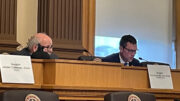By Jeffrey A. Roberts
CFOIC Executive Director
With a proposed property tax increase on the November ballot, Conifer resident Melody Mesmer thought that residents of the Elk Creek Fire Protection District ought to know how much district employees have been paid over the last few years in salary and overtime.
But even though such information is public under the Colorado Open Records Act (CORA), the fire district isn’t handing it over.
Elk Creek denied Mesmer’s request because the compensation information she seeks is mingled in payroll records with Social Security numbers and other confidential data. Unlike open-records laws in some other states and the federal Freedom of Information Act (FOIA), the law in Colorado does not explicitly require – nor does it encourage – records custodians to redact private information from records and then release portions that are public (except under a very few circumstances).
“I’m just insanely frustrated that I can’t get a public record,” Mesmer says. She wonders why a district with just nine paid employees cannot – or will not – give her year-end payroll reports with confidential information blacked out. “I’ve seen emails (redacted) that way. If they need a buck-fifty for their time with a marker, I’m happy to pay it.”
It’s not that simple or inexpensive, says Richard Toussaint, attorney for the Elk Creek district. Year-end payroll reports, which are produced for the district by an outside vendor, show multiple deductions and other points of private information for each monthly pay period. “There isn’t just one line in there that says what the (employee’s) pay is for the year.”
The district did provide Mesmer with salary and overtime data for volunteers who are compensated for battling fires in other parts of the state because “that one was simple to redact,” Toussaint notes. “This other one was definitely going to take some time,” and district officials also worried that they might mistakenly release something confidential.
The bottom line for Mesmer is that redacting the payroll records she requested would require more effort than the district, which has one administrative employee, is willing put forth. “That’s what the AG said,” Toussaint says. “You don’t have to do it if it’s a ton of work.”
Toussaint is referring to a 2001 opinion from then-state Attorney General Ken Salazar which says that a government in Colorado “is not required to black out, or ‘redact,’ confidential portions of a record. It can lawfully refuse to let you see that record because of its partial confidential content.”
Federal agencies aren’t allowed to do that. FOIA says that “any reasonably segregable portion of a record shall be provided to any person requesting such record after deletion of the portions which are exempt…” Open-records laws in some other states also are worded so that governments cannot outright reject records requests simply because confidential information is mixed in with information that is publicly releasable.
In Wisconsin, “if you have to withhold something, you still have to release the rest of the record,” says Bill Lueders, president of the Wisconsin Freedom of Information Council. Not only that, the Wisconsin Supreme Court ruled last year that governments cannot charge the public for time spent deleting portions that are private.
Although CORA is silent, in most circumstances, on whether records custodians are required to redact confidential information, two Colorado Supreme Court decisions have been broadly interpreted to mean that such a requirement is not implied under the law, either. In Sargent School District No. RE-33J v. Western Services, Inc., in 1988, the court held that the custodian of individual scholastic records did not have to delete exempt data to make the records releasable under the open-records law. In Background Information Services, Inc., v. Office of the State Court Administrator, in 1999, the court ruled that the state judicial system did not have an implied duty to manipulate computerized court records so that they could be disclosed.
But media law attorney Steve Zansberg, who serves on the Colorado Freedom of Information Coalition’s executive committee, says the case law “is not all that clear cut” because one Supreme Court case addressed records specifically exempted under the open-records law (scholastic records) and the other addressed criminal justice records, which are covered by a law (the Criminal Justice Records Act) that gives records custodians more discretion to withhold information.
Zansberg also notes that more recent Court of Appeals and Supreme Court rulings expressly encourage the redacting of confidential information when possible. A footnote in the Supreme Court’s 2008 decision in Freedom Colorado information, Inc. v. El Paso County Sheriff’s Department calls redaction “an effective tool to provide the public with as much information as possible, while still protecting privacy interests when deemed necessary.” The Supreme Court there directed a criminal justice agency to exercise its power of redaction “sparingly” to maximize the amount of information disclosed to the public.
“We think (the duty to redact) is an unsettled question,” Zansberg says. “But even if it’s a matter of discretion and not a clear duty, to withhold information about public business that is easily segregable information is an abuse of discretion.”
Many governments routinely release public-employee compensation data and some, like the state of New Jersey, even publish it online. Why is it in the public’s interest to know how much government employees are paid? In these days of straining government budgets and underfunded public pensions, it doesn’t take much research to find newspaper stories with headlines like this: “Public pension ‘spiking’: Overtime hours soar for St. Paul fire supervisors.”
Follow the Colorado Freedom of Information Coalition on Twitter @CoFOIC. Like CFOIC’s Facebook page. Do you appreciate the information and resources provided by CFOIC? Please consider making a tax-deductible donation.




